Keeping Your Dog Safe

Your dog may be the baby of the family, but there's more to keeping this baby safe than his yearly trip to the vet. Having one veterinary visit each year is just the beginning of the quest for a safe and healthy life for your canine companion, and following some simple guidelines will help you keep him out of trouble the other 364 days of the year.
Food Safety and Your Dog
If you like to eat it, so does your dog, but that doesn't mean he should. Foods high in fat, sugar, and salt are poor choices for your pet. Table scraps are not a meal, and consistent snacking on people food can be a nutritional disaster. Your dog needs a solid combination of meat, carbohydrates, and vegetables, in about equal measure. Some fat is okay; processed sugar is not.
Another consideration is that some foods people eat don't only pose nutritional problems, for dogs, they are outright poisons. Although most people know that chocolate is bad for dogs, were you aware that even cocoa mulch in the garden can pose a threat if your dog likes to dig or roll in it? Commercially available bones can also be a hazard. As a result of processing, they are usually very dry and brittle, often shattering into shards that can be a digestive nightmare for your dog.
Foods like onions, garlic, and beans can be toxic, as can the pits, stems, and leaves of cherries, apricots, and plums. You should also be careful to keep your dog away from grapes, raisins, nutmeg, coffee grounds, and macadamia nuts.
Putting on the Pounds
Excess weight can lead to medical problems for your dog, including heart and joint conditions that can be painful, expensive, and possibly lead to a shortened life. Because you face some of the same issues, you may be a little indulgent about a couple of extra pounds, but it takes your dog a while to lose even a pound of extra flab, and treating him with prescribed medications on a regular basis when things get out of hand is a poor substitute for good nutrition and a healthy weight now.
Restrict your dog to the recommended portions of a quality dog food. If you supplement his diet with treats, cut back on his regular food. Limit his fat intake, and eliminate his consumption of sugar and salt. If you have the time, try making him dog treats. These can be made ahead as easily as you make cookies. Making some of his food will give you the satisfaction of knowing that you are giving him some extra tender loving care. It will also have the advantage of letting you know exactly what's going into his stomach.
Home Safety and Your Dog
Dogs should never be left unattended when they have been tethered. When out of doors, they can become the target of larger, aggressive dogs, even in an enclosed yard. Indoors they can accidentally fall off stairs, or become trapped underneath furniture and suffocate.
As with children, keep objects that are a choking hazard away from your dog. Even dog toys and small bones can present problems, so supervise playtime so you can keep an eye on what your dog is up to.
Keep sharp objects, like scissors and letter openers, out of reach, and make sure that all of your electrical outlets are covered. To protect your pet from falling objects, keep power cords out of areas where your dog may become entangled in them. If your dog likes to chew, it's particularly important to keep him away from electrical cords. Spray (temporarily unplugged) cords with pet repellent if chewing is a problem.
Holiday Safety and Your Dog
If you don't know it already, you'll soon discover that your dog likes holidays as much as you do. He likes the hoopla, special food, presents, visitors, and the opportunities special occasions provide to do and experience new things.
These often-chaotic times are prime occasions for your dog to get outside unsupervised, or into restricted areas of the house. Be kind to you home and your pet by having a containment plan when people come to call or your routine changes. This may be a special, quiet room where he can be safe for a while, or a decision to remove him from the home completely.
Your dog is part of the family, but he isn't human, even though it seems like it sometimes. He has special needs, and understanding how to keep him safe and healthy will help you prolong his life. Your informed supervision of his daily routine is the best gift you can give him.
Doggies Den: Latest Articles
 Homemade Thanksgiving Treats for Your Dog
Homemade Thanksgiving Treats for Your Dog
NUTRITION We all want to include our dogs in our holiday celebrations, but hopefully, you're aware that sharing table scraps with your dog isn't always the best idea.
 Keeping Your Dog Safe during the Summer Months
Keeping Your Dog Safe during the Summer Months
HEALTH Summer is coming on fast, so it’s time to plan how you will keep your dog safe and healthy through the lazy, carefree, warm days.
 Vaccination Time Again-Keeping Your Puppy Healthy
Vaccination Time Again-Keeping Your Puppy Healthy
DOG HEALTH So you have your new puppy picked out. There are quite a few shots, treatments and examinations that will keep the newest member of your family healthy.
 Canine Thanksgiving Feast
Canine Thanksgiving Feast
NUTRITION With the wide variety of food at Thanksgiving dinner, chances are you'll want to give your dog something special, too. If you're contemplating what to feed your dog for the holiday, here is a guide to a great Canine Thanksgiving Feast.
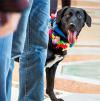 Dog Walking Tips Every Owner Should Know
Dog Walking Tips Every Owner Should Know
DOG FUN Walking your dog is not only crucial to keeping him healthy and happy, it strengthens the bond between your canine friend and his caregiver. There are a lot of obstacles out there. Don’t forget these simple tips to keep your walk fun and safe in the outside world.
 The Benefits of Physiotherapy for your Dog
The Benefits of Physiotherapy for your Dog
HEALTH The same techniques that physiotherapists use to treat a variety of injuries and conditions in humans have been adapted to suit animals with great success. Family pets, show dogs, and working dogs can all benefit greatly from physiotherapy. Dogs whose activities involve a lot of agility are especially susceptible to the types of problems that physiotherapy can address.
 The Decision- Adding a Dog to Your Family
The Decision- Adding a Dog to Your Family
FIRST TIME OWNERSBringing a dog into your family is a decision where many people don’t realize it’s magnitude until after they have the dog. There are a number of things that you need to research before you decide to purchase a dog, and it starts right in your own home.
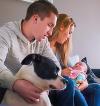 Bringing Your Dog Into Your New Baby's Life
Bringing Your Dog Into Your New Baby's Life
HEALTH Many believe that a dog and a new baby cannot happily coexist, so therefore the dog has to go. This is not necessarily the case.  A new baby does not mean you have to abandon your dog.

Doggies Den:
Most Popular Articles
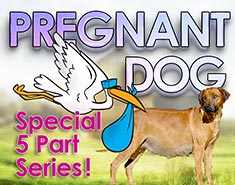
Dog Pregnancy Symptoms
HEALTHIf you suspect your dog might be pregnant, check out part one in this series on pregnant dogs, where we cover pregnant dog symptoms.
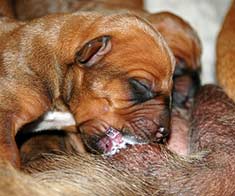
Dog Birth
HEALTHIn the third article of our dog pregnancy series, we look at the wonderful, but messy, process of bringing newborn puppies into the world.
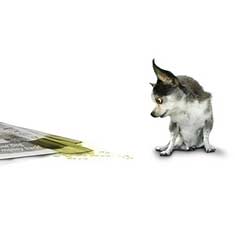
Indoor Dog Potties
DOG PRODUCTSIt's been a long day at work. You were so busy, you didn't even take time to eat a sandwich, let alone run home to let your dog out. You're on your way home, knowing the poor dog is crossing his or her legs by now, when your car breaks down, delaying you even further. Can't somebody make this easier?
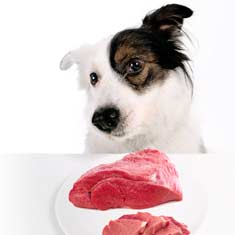
Your Dog’s Digestive System
PHYSIOLOGYEver wonder why your dog eats so fast? Or why he eats gross things? Or why he gets sick to his stomach? Or why his waste stinks so bad? Some of these things are normal, some are not.

Canine Respiratory System
BREATHINGThe basic function of your dog's respiratory system is to bring oxygen in to and remove carbon dioxide from the body. Knowing the symptoms of respiratory diseases can help you help your stay healthy.
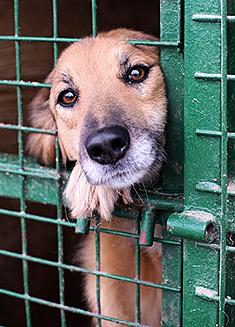
Shelter Dog Adoption Tips for Success
ADOPTION Are you intimidated by the prospect of "rescuing" a dog from a shelter? One reason that you may be wary of adopting a dog from a shelter is not knowing how to choose. Adopting a dog from a shelter can be a rewarding process, if you're prepared to do a reasonable amount of research.
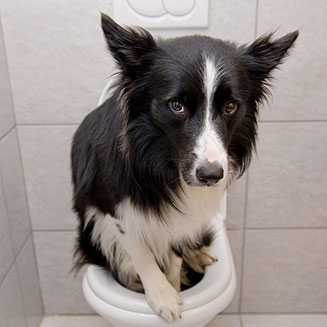
Canine Urinary Tract Infections
SYMPTOMS AND TREATMENTDoes your dog seem to be having trouble relieving his or her bladder? Learn how to recognize the signs of urinary tract infections and how to treat them before they spread.
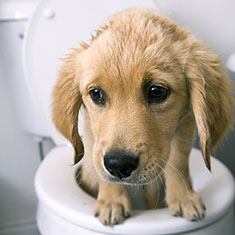
What to do for Dog Diarrhea
SYMPTOMS AND REMEDIESIf you have dogs in your house for any length of time, you have likely experienced at least one bout of dog diarrhea. Beyond the pain in the tuckus involved in cleaning up the mess, you should know what causes diarrhea, and when it's important to see the vet.
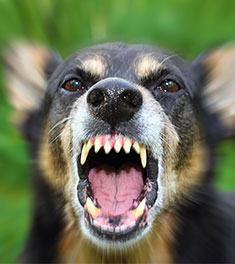
What to do for a Dog Bite
DOG BEHAVIOR Getting bitten by a dog can be scary, and you may be tempted to run around in circles for a while, trying to figure out what to do. Here's our guide to help you manage the situation.
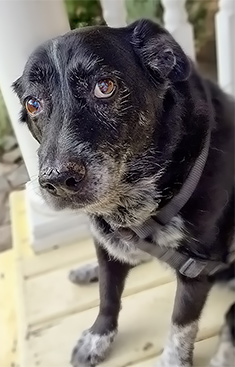
Top Ten Tips for Living with a Senior Dog
DOG HEALTH Bringing home a new puppy is so exciting, but it doesn’t take all that long for your exuberant puppy to grow into a senior dog who may have special needs. Here are the doggies.com top ten tips for taking care of your companion who has been with you through so much.
